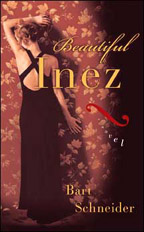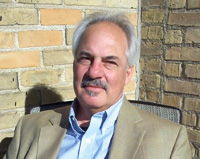Beautiful Inez Plays Upon Author's Past
 Bart Schneider lives a life steeped in words. He is editor of Speakeasy Magazine, has for three years served on the board of the National Book Critics Circle, and was founder and editor of Hungry Mind Review. He is married to a poet, Patricia Kirkpatrick, and his own writing endeavors began with poetry, then playwriting. Most recently, he has written three novels -- the newest, Beautiful Inez, is out from Shaye Areheart Books/Random House this month.
Bart Schneider lives a life steeped in words. He is editor of Speakeasy Magazine, has for three years served on the board of the National Book Critics Circle, and was founder and editor of Hungry Mind Review. He is married to a poet, Patricia Kirkpatrick, and his own writing endeavors began with poetry, then playwriting. Most recently, he has written three novels -- the newest, Beautiful Inez, is out from Shaye Areheart Books/Random House this month.
"I've always been a writer," Schneider said in a recent interview, adding that, when he started Hungry Mind Review in 1986, his novel-centric proclivities hadn't yet been fully revealed. "I was able to live in a book-world where nobody knew I was a writer. It's a very nice situation, to write undercover; nobody expects anything from you, and you probably don't expect a whole lot from yourself."
After working incognito for five years, Schneider produced a novel that, he said, "I think fondly of, not because it's good or because I want it published, but because it confirmed for me that I'm a finisher. I was determined to write the next one much faster." Two years later, Blue Bossa, set in 1970s San Francisco, was published. His next novel, Secret Love (published in 2001), returned to San Francisco, this time in the 1960s.
 Bart Schneider |
And now, Beautiful Inez has emerged, a tale of music and love, sensuality and sadness, peopled with compelling, richly detailed characters. The book serves as a prequel to Secret Love: "What I started with," said Schneider, "was a woman, connected to the last book ... and I wanted to explore what it would be like to have an engine inside of you that made you want to eliminate yourself."
Despite this melancholy premise, the book is uplifting in myriad ways, such as the vignettes that convey the joy and wonder Inez and Sylvia feel as their love grows, Inez's interactions with her sweet son, and the clever and surprising way language is used to offer a glimpse into Sylvia's personal history. "I had to spend time with etymology," the author said. "It gives you a whole other way of having things resonate."
Added Schneider, "What I liked about writing this book is that I knew I was writing closely autobiographical material, but I wrote unconsciously; it wasn't until I was finished that I could let myself look at what I had done."
The character of Inez, a child prodigy turned symphony violinist, harks back to Schneider's father, who played violin with the San Francisco symphony for 50 years, and to his mother, who suffered from depression, the author said. "My father was someone who loved the daily-ness of playing in a symphony. I tried to imagine that, with a sense of what it would be like in the early 1960s to be a depressive woman before there was Prozac, before people even talked about depression."
Inez's despair does not render her immune to Sylvia Bran's seduction, nor to falling in love with the young woman who is a single, bohemian counterpoint to Inez's married, more traditional lifestyle. Neither woman feels able to publicly acknowledge their relationship, and, Schneider said, "I can imagine how often that happened in gay culture.... Inez couldn't leave her family and live with Sylvia. There was no way of making that leap."
The advent of the Cuban Missile Crisis only adds to the drama of the characters' lives, bringing a heightened clarity and urgency to their every action. "I like to use topical experiences in the moments of the day," Schneider said. "I was 11 [in 1962], and I remember the gradations of fear people had about that. It was an interesting thing to play off of Inez's existentialist nature."
Schneider explored the characters' sensual sides as well: "Food and sex, for me, are a way of grounding things in sensual reality. It's a way I feel I can earn characters, sometimes -- feeling what it's like to be in a particular landscape, what their skin feels like. If I can get in their bodies, I can get in their souls."
The novel has gotten into his soul in turn, it seems. The author explained, "I think I finally found my form with writing novels. The thing that's wonderful about writing novels, for my particular temperament -- I may be somewhat like my dad -- is that there's no room for grandiosity. There's something about writing a novel that's workmanlike and unglamorous. You have to train yourself to expect nothing on any given day, to let things accrue."
And, he added, "What's really wonderful about that kind of process is to turn off the part of myself that would edit, and anything goes. To give myself that much permission makes writing what it should be, which is play."
Schneider's next adventure will be a reading tour for Beautiful Inez, which kicks off in his hometown of St. Paul, Minnesota, at Micawber's Bookstore, and continues to the Bay Area. Said Schneider, "I really like Micawber's -- it's small, but it has the feel of one of my favorite bookstores in New York City, Three Lives and Company. You walk in and feel every book has been handpicked for you, and you wonder, 'How did you do that? How did you know that this should be mine? And this should be mine? And this should be mine?'"
When he's completed his reading (and, it seems likely, shopping) tour, Schneider will continue working on a new novel. He said, "It's set in Minnesota, in the present day -- all my previous books were set in the '60s or '70s, so this will be a nice change." --Linda Castellitto

